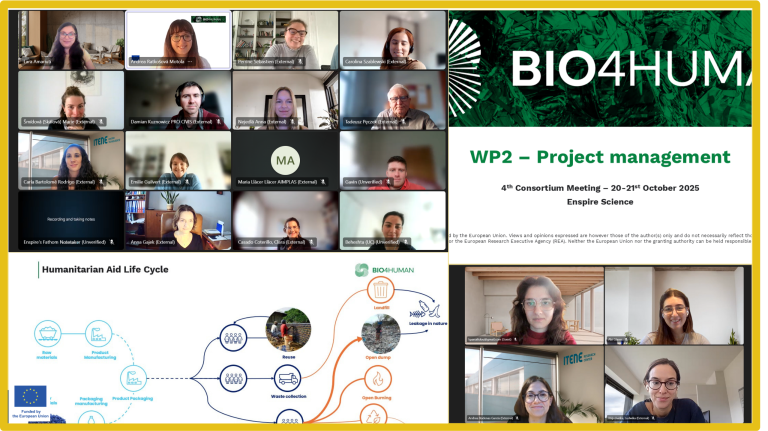Bio4HUMAN’s Fourth Project Consortium Meeting
20-21st October 2025, online – The Bio4HUMAN consortium continues to move forward in its mission to scope for sustainable bio-based solutions for solid waste management in humanitarian applications. Recent progress within our work entails the environmental Life Cycle Assessment (LCA) of innovative bio-based solutions and kick-off work on the socio-economic and governance evaluation of Bio4HUMAN proposed solutions through direct engagement with stakeholders in the Democratic Republic of Congo and South Sudan.

Understanding Environmental Impacts
Under the work led by WeLOOP, the project is applying LCAs to measure and compare the environmental performance of shortlisted bio-based products against their conventional alternatives. Applying the EU’s Product Environmental Footprint (PEF) methodology, the analysis identifies key environmental hotspots and opportunities for improvement. Moreover, other indicators specific for biobased materials were identified and used for hotspots analysis, including the effects of microplastics emissions and consideration of biogenic carbon content.
Early findings reveal that while both reference and bio-based products share similar environmental challenges, bio-based solutions tend to show lower impacts at the end-of-life stage. Anaerobic digestion and Black Soldier Fly proposed technologies for end-of-life provide consistent solutions and benefits for Humanitarian action camps even if their environmental impacts depend on the local context. These results highlight the potential of innovative materials and composting technologies to make humanitarian supply chains more sustainable.
The next phase will identify the most environmentally efficient products by comparing the solutions with reference items and integrate these results into a Life Cycle Costing (LCC) tool, which will support humanitarian organisations in making informed, sustainability-driven procurement decisions.
Exploring Social and Governance Dimensions
Under the coordination of Polish Humanitarian Action (PAH), another part of the project is assessing how bio-based products could contribute to social well-being, economic development, and governance improvements related to solid waste management in humanitarian settings.
The evaluation, including a Social LCA (S-LCA), considers aspects such as employment potential, community acceptance, accessibility, and equity. Alongside this, legal and policy frameworks related to solid waste management, recycling, and logistics are being reviewed in both the Democratic Republic of the Congo and South Sudan.
Ongoing fieldwork and community consultations are gathering first-hand insights from local actors such as municipalities, humanitarian organisations, and community members to assess whether the proposed solutions are both feasible and relevant on the ground.
In the months ahead, a SWOT analysis led by PRO CIVIS will bring together findings from across the consortium to identify practical pathways for scaling up sustainable bio-based products within the humanitarian sector.
Next Steps
Alongside this, the consortium has started discussions on the creation of a replication roadmap and held a preliminary internal workshop run by Enspire Science during the recent consortium meeting. This roadmap will outline how the most promising bio-based solutions can be scaled and adopted by other humanitarian actors, taking into account environmental, socio-economic, and governance considerations, as well as community feedback. The roadmap will include practical tools, guidance for implementation, stakeholder engagement strategies, and dissemination plans to ensure the sustainable and circular deployment of innovative solutions in humanitarian contexts.
With the hotspot analysis report due for completion this week, the consortium will move forward with the comparative LCA and the ongoing socio-economic and governance evaluations in the coming months. Over time, these efforts will help reduce the environmental footprint of humanitarian operations while enhancing the social, economic, and environmental management of waste-related solutions. We thank all partners for joining in and participating in Bio4HUMAN’s 4th consortium meeting.
For more information about Bio4HUMAN and opportunities to get involved in the project, please email us at inquiry@bio4human.eu and follow us on LinkedIn, X, and Instagram.
